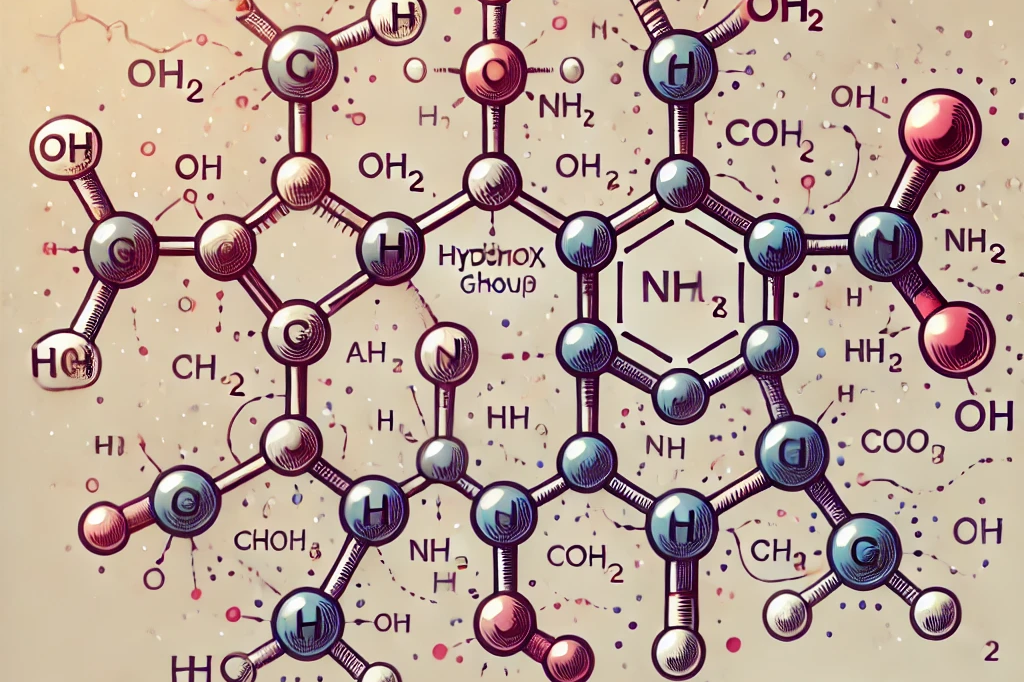Glycine

Glycine is an amino acid that is found in many proteins and fulfills important functions in your dog's body. In this article, you'll find out what glycine is, what its benefits and disadvantages are and how you can give it to your dog.
What is glycine?
Glycine is the smallest and simplest amino acid there is. It has the chemical formula C2H5NO2 and is non-chiral, i.e. it has no dextrorotatory or levorotatory form. Glycine is non-essential, which means that your dog can produce it himself and does not necessarily have to ingest it through food. However, sometimes the body's own production may not be sufficient to cover the requirement. In this case, it may be a good idea to feed your dog additional glycine.
Glycine is involved in many processes in the body, for example:
- It promotes the formation of haemoglobin, the red blood pigment that transports oxygen.
- It is converted into creatine, which is important for the muscles.
- It ensures the stability of collagen, the structural protein of connective tissue, which is found in bones, teeth, skin and tendons.
- It acts as a neurotransmitter in the brain and has a calming effect.
- It protects DNA from damage and improves internal cell self-cleaning.
- It supports the immune system and has an anti-inflammatory effect.
What are the benefits of glycine for dogs?
Glycine can help with or prevent many diseases, for example
- Diabetes: glycine can lower blood sugar levels and improve insulin sensitivity.
- Fatty liver: Glycine can support liver function and reduce the accumulation of fat in the liver.
- Arteriosclerosis : Glycine can prevent the formation of plaque in the blood vessels and lower blood pressure.
- Nerve disorders: Glycine can protect nerve cells and promote regeneration.
- Neurodegenerative diseases: Glycine can slow the breakdown of brain cells and improve cognitive performance.
- Depression: Glycine can brighten the mood and increase the release of serotonin.
- Sleep disorders: Glycine can make it easier to fall asleep and improve sleep quality.
- Heart failure: Glycine can strengthen heart function and reduce the risk of heart attack or stroke.
- Mitochondrial d ysfunction: Glycine can improve energy production in the cells and reduce oxidative stress.
- Endothelial dysfunction : Glycine can improve the function of the inner wall of blood vessels and promote blood circulation.
- Connective tissue weakness: Glycine can stimulate the formation of collagen and tighten the connective tissue.
- Wound healing disorders: Glycine can accelerate wound healing and reduce the risk of infection.
- Osteoporosis: Glycine can increase bone mass and reduce the risk of bone fractures.
- Retinal diseases: Glycine can protect vision and prevent degenerative changes in the retina.
- Tumor growth : Glycine can inhibit the growth of cancer cells and increase the effectiveness of chemotherapy or radiation.
What are the disadvantages of glycine for dogs?
Glycine has no known side effects or interactions with other substances. It is a safe and well-tolerated nutrient that has no toxic effects in high doses. However, care should be taken to ensure that glycine is not fed in excessive quantities, as it could otherwise hinder the absorption of other amino acids. Care should also be taken to ensure that glycine is not combined with other flavor enhancers, as it could otherwise alter the taste sensation.
How can glycine be supplied to dogs?
Glycine is found in many protein-rich foods, such as pork, salmon and soybeans. A good source of glycine is also bone broth, which is cooked from bones and cartilage. Bone broth not only contains glycine, but also other important nutrients such as gelatine, glucosamine and minerals. You can make bone broth yourself or buy it ready-made and give it to your dog as drinking water or with food.
Another way of supplying glycine to dogs is through supplementation. There are various preparations that contain glycine, for example as a powder, capsules or tablets. The dosage depends on the size and health of the dog, but a general recommendation is around 0.1 to 0.5 grams per kilogram of body weight per day.
Glycine is an amino acid that has many benefits for your dog's health. It can help or prevent many diseases and has no known side effects. You can give glycine to your dog through food or as a supplement.
If you notice any signs of hypersensitivity or poisoning in your dog, you should see your vet immediately. We are not a substitute for a vet, but we try to be as accurate as possible. Every dog reacts differently and we recommend you get a second opinion or consult your vet if in doubt.
Stay healthy and take good care of your four-legged friend!😊
Similar to Glycine
Lysine is one of ten essential amino acids for dogs. This means that dogs cannot produce this amino acid themselves, but must obtain it from their diet. Amino acids are the building blocks of...
Alanine is one of the so-called non-essential amino acids, which means that the body can produce it itself and does not have to absorb it from food. Alanine is mainly formed in the liver from other...
Serine is a non-essential amino acid, which means that your dog's body can produce it on its own, but additional intake through food can support your pet's health and well-being. Serine plays an...
Valine is one of the essential amino acids, which means that it is vital for dogs but cannot be produced by the body itself. Valine must therefore be ingested through food. As one of the three...



